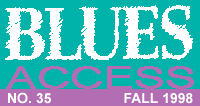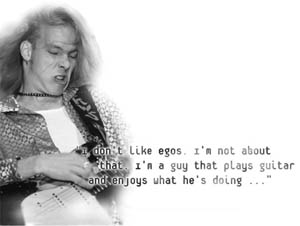

Kenny Wayne Shepherd was seven years old when his father took him backstage at a festival in Louisiana to meet Stevie Ray Vaughan. Vaughan sat Shepherd on an amp, giving him a spectacular view of the show. From that moment, the Shreveport, Louisiana, native, now 21, began to define himself through Vaughanís music and influences. He was 16 when he signed a recording deal with Giant Records, with distribution through Warner Brothers. His first release, Ledbetter Heights, which came out in September 1995, strongly reflected Vaughanís influence, sometimes to the point of mimicry. (See review, BA #26). Shepherd has since toured with B.B. King, Bob Dylan, Aerosmith, Lynyrd Skynyrd, Van Halen, Joe Satriani and Steve Vai. He recently performed in Australia and Japan and has appeared on the late-night shows of David Letterman and Conan OíBrien. His second album, Trouble Is Ö, released last October, still owes a heavy debt to SRV. Vaughanís former bandmates appear on nine of the albumís 12 tracks (James Cotton also makes a guest appearance on harmonica). The album likewise reveals the substantial influence of Jimi Hendrix on Shepherd, particularly on the radio-friendly "Slow Ride." Overall, though, itís a far more diverse and original outing, marrying a variety of blues and rock guitar traditions to form the beginnings of a unique personal voice. Your most recent record, Trouble Is Ö., is a lot different than Ledbetter Heights. I want to get your impression on how they are different and why they turned out that way? The first album, Ledbetter Heights, was a little more in the vein of Stevie Ray Vaughan-type stuff. Not necessarily saying itís the same as what he did, but itís just a little more like a Southern blues thing, whereas this one takes on more of a Jimi Hendrix feel. I was listening to a lot of Hendrix before I recorded this album, and I really wanted to try and change up some of the things about the music, do some different things that arenít normally done, like chord progressions and vocal melodies. I just wanted to shed a new light on the subject. So this happened on purpose, it wasnít just a natural progression of events? Well, it was where I was naturally heading, because I was listening to a lot of Hendrix, and indirectly that influenced what I was writing and what I was playing. But I definitely made a conscious effort to try and make some different things, put some different things inside the music. I still hear lots of Stevie Ray influence on the new record, too. Oh, definitely. Thatíll always be there. But thereís nothing quite as traditional as "Aberdeen" or "Shame Shame Shame" [traditional blues songs from Ledbetter Heights] on the new one. It is, but it isnít. Iíd like to say itís blues for the í90s, you know what I mean? Every song that I wrote I started off with a traditional guitar riff, and I just tried to incorporate something different into it. Not necessarily rock or anything like that, just something that was different that worked, instead of a I-IV-V chord progression all the time. I wanted to play something different. In your cover of Bob Dylanís "Everything Is Broken," I hear some of the classic Texas shuffle and some of the Hendrix, like that augmented ninth chord punching in there. On that one, actually, I tried to go for a real Jimmie Vaughan kind of feel. If I name off a couple other songs, could you tell me a little bit about what your inspiration was for them? Or just pick a couple youíd like to talk about. Every particular song isnít aimed directly at trying to simulate another personís style. Obviously, the Hendrix tune ["I Donít Live Today"] is inspired by Hendrix, "Slow Ride" is definitely Hendrix-inspired, but Iíd say the majority of the others are pretty much whatís coming out of me. I know the story about the first time you saw Stevie Ray and understand how that hooked you to be interested in playing. But you stayed hooked, and stayed with it over the years. What do you think made it that way? I was just always attracted to this music. I like all kinds of music, but this is just the music that grabbed me. It always has a real groove to it, and thereís always a message to the music and the lyrics and itís all about playing from the heart. And thatís what music is all about. At what point did you realize that it was something more than a hobby, something that you really loved, that it might actually be a career? About the age of 14, thatís when I really figured out, thatís when I got on stage ó well, actually, I got on stage at 13, but, thatís just when I really started playing. I figured out that I could actually do this, perform live, and I went into the studio for the first time and did demos. I put my band together when I was 15 and by the time I was 16 I had a record deal. How did it come about for you to be discovered? There was just a big buzz going around the industry. A lot of people were talking about "this kid" ó they all had different ages ó "this 15-year-old, this 13-year-old or whatever kid in Shreveport that could play the blues." Just word-of-mouth, really, and once one record company approaches you, then they all approach you and you just decide who you want to go with. Youíve been on the Billboard charts as a blues artist and featured in magazines as a blues artist, a blues player. Do you think of yourself that way? Yeah, I definitely would say Iím a blues player. Thatís what I learned how to play when I picked up the guitar and thatís what I love to play. All my music isnít like straight blues, you know, but thatís just other influences coming out. But I definitely consider myself a blues player. I saw one article that quoted you saying that you play "blues-based rock'n'roll," and I was curious how you saw yourself in that continuum of styles. Like I said, I really just consider myself a blues player. I play blues rock, a lot of my songs rock pretty hard, but I think a lot of that has to do with age, because young people like to rock. Older people do, too. What do you think it is about you ó or Jonny Lang and some of these other folks, too ó that has caught the imagination of the people who buy records? I just think that people want to hear real music. Theyíre intrigued about the age ó a lot of times thatís what first interests them. Itís good for people to hear really good music and people playing their instruments, and then especially if itís a young person playing their instrument, and playing from the heart, instead of screaming and all these loud, heavy, distorted guitars. I wondered how much you felt like it had to do with the idea of you being younger, at least initially, to get people hooked. Yeah, I think that initially thatís what got a lot of peopleís attention. In my case, I think the music kind of speaks for itself, especially after the second album came out and that way people knew that it wasnít just like a one-time thing. I hope to have a long career doing what Iím doing. I love to make good music, and hopefully Iíll get to do that for a pretty good little while. There are some older players that have been around that work some of the same turf that you do, folks like Jimmy Thackery, for example. Theyíre doing the same kind of thing and havenít gotten quite the same exposure for it Ö Thereís really no real explanation for it. Thatís kind of the way things go. You never know. Jimmy Thackery could make a record and sell two million copies on the next one, you never know. But, like I said, thatís why I try and turn people on to all these other artists. Often, young people whoíve been successful, say in the movie business, at some point in their lives have to back up and refocus. So far, have you been able to keep focus? Iíve always tried to keep a level head, keep my feet firmly on the ground. I donít like egos. Iím not about that. Iím a guy that plays guitar and enjoys what heís doing, so when I look back on all the people that Iíve met, people that Iíve played with that were my idols, it really blows your mind. Sometimes you canít even believe it actually happened. But Iíve just tried to keep a level head about the whole thing.
|

